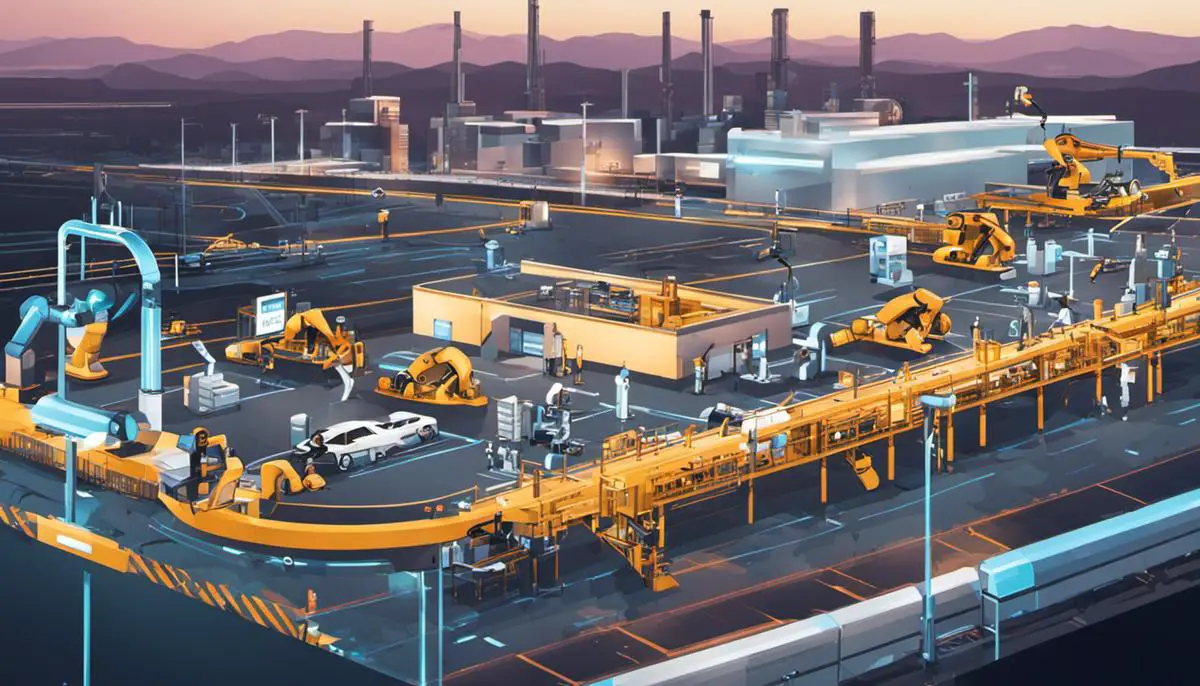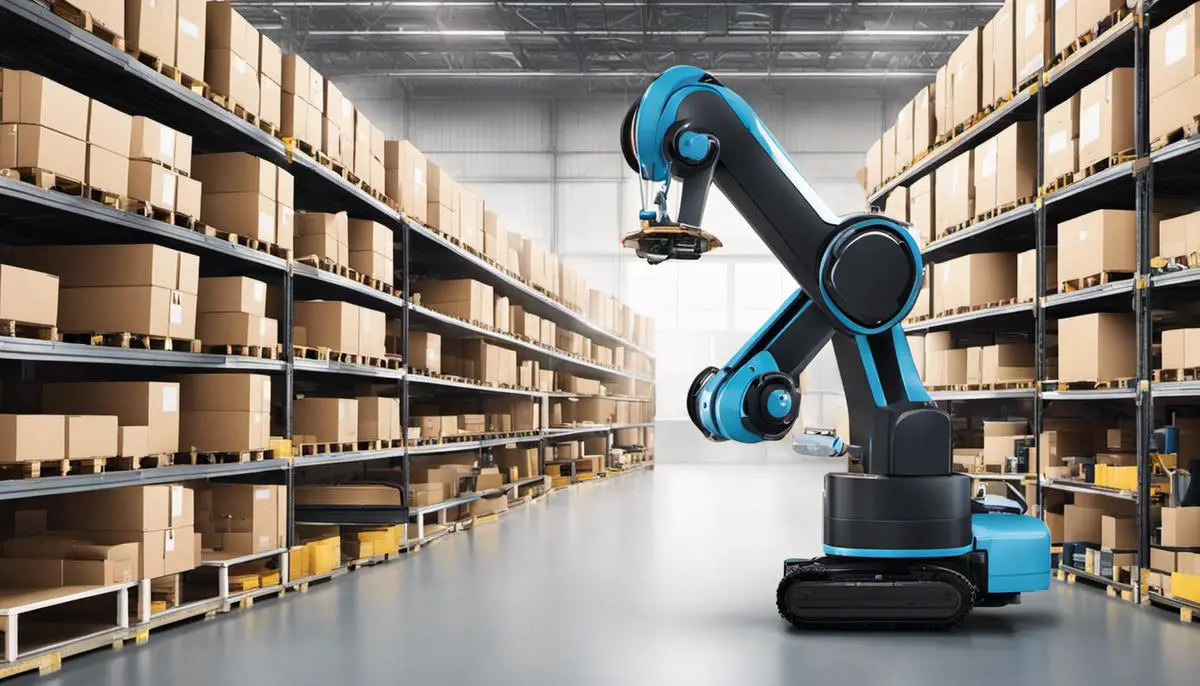Enhancing Auto Supply Chain with AI: A Comprehensive Guide
Amidst the ever-evolving world of technology, the auto industry finds itself grappling with the complexities of managing a seamless supply chain. An intricate web of manufacturers, suppliers, distributors, and retailers forms the backbone of this industry, but is not without its fair share of challenges. By understanding the traditional functioning of the auto supply chain and its inherent hurdles, we can look towards innovative solutions that promise seamless operations. One vigorously emerging solution is Artificial Intelligence (AI), well-recognized for its analytical prowess, forecasting accuracy, and decision-making capabilities. As we delve further into AI’s potential in revolutionizing auto supply chain management, we will come across real-world examples and case studies that indicate the transformative effects of AI in the realm of auto industries.
Understanding the Auto Supply Chain
Understanding the Auto Supply Chain
The automotive supply chain is a complex network of manufacturers, suppliers, and logistical partners working in unison to design, produce, and distribute vehicles efficiently. From raw material suppliers to parts manufacturers through to the assembly lines and finally to the consumer, the process involves numerous stages. Key components include raw materials suppliers, tiered suppliers of auto components, automobile manufacturers or original equipment manufacturers (OEMs), distributors, and automotive dealerships.
With the globalization of the automotive industry, interdependencies between the various links in the supply chain become increasingly complex and layered. This process also becomes highly susceptible to external interruptions such as natural disasters, political instability, trade restrictions, and fluctuations in demand.
Challenges in the Auto Supply Chain
One of the key challenges facing the automotive supply chain is forecasting demand. Due to the long product life cycles in the auto industry, predicting customer demand accurately becomes a prerequisite to efficient supply chain management. Inaccurate forecasts can lead to inventory imbalance, with both overstocking and understocking posing significant financial and operational risks.
Supplier risk management is another significant challenge. Suppliers may fail due to financial instability, technical problems, or regions’ socio-political issues. A disruption in the supply chain could halt production and result in massive financial losses. Furthermore, with the burgeoning trends related to environmental sustainability, electric vehicles, and changing regulatory scenarios, the traditional supply chain faces the pressure to adapt and evolve.
Logistics and transportation form another major bottleneck in the auto supply chain. With the ever-increasing sprawl of this network due to globalization, managing logistics efficiently becomes a task of paramount importance and difficulty.
Quality control is equally critical, as faulty parts may not only disrupt the supply chain but also result in recalls, negative PR, and potential legal liabilities.
The Role of AI in Auto Supply Chain Management
Recognizing these challenges, many organizations are turning towards Artificial Intelligence (AI) to create a more resilient, transparent and efficient supply chain. With the utilization of AI, it’s possible to forecast demand more accurately using advanced predictive analytics. This can take into account a wider variety of factors such as macroeconomic indicators, market trends, and historical data to significantly improve the quality of forecasts.
Supplier risk can be mitigated with the use of AI, which can predict potential supplier failures based on factors like financial indicators, quality control reports, and regional stability data. In this way, organizations can take proactive measures and avoid disruptive surprises.
In the area of logistics and transportation, AI optimization algorithms can calculate the most efficient routes and schedules. This not only saves cost but also reduces carbon emissions, contributing to sustainability goals.
In the quest for quality control, AI’s capabilities, particularly machine learning and computer vision, can detect defective parts or faulty processes earlier, minimizing the probability of large-scale recalls and damaged reputations.
Uncovering AI’s Potential in the Auto Supply Chain
The future of the automotive supply chain could be reshaped with the integration of Artificial Intelligence (AI). AI developments are heading in a direction where predictive maintenance is feasible. This could mean that equipment or part failures can be anticipated, leading to preventive maintenance scheduling, and the ability to minimize downtime.
In addition, the deployment of autonomous robots in warehouses and assembly lines showcases AI’s potential in augmenting human effort. This not only aims to reduce errors, but also to significantly enhance productivity levels.
As the automotive supply chain sector becomes increasingly competitive and challenging, the introduction of AI may just be the game changer that propels the industry towards a leaner, more efficient, resilient, and sustainable future.

Introduction to AI and its Capabilities
Understanding the Sphere of Artificial Intelligence
Simply put, Artificial Intelligence (AI) is associated with the creation of computer systems capable of replicating human intelligence. This includes learning from experiences, logical reasoning, self-correction, perception and even linguistic abilities. The realm of AI spans a wide array of fields, from the creation of self-governing machines to the development of intelligent tutoring systems. Given its wide-reaching capabilities, AI holds the potential to bring about transformative change across industries, enhancing processes, productivity, and the performance of the workforce.
AI Capabilities and its Applications
The capabilities of AI are largely based on its ability to process and analyze large amounts of data, enable better decision-making, and enable automation. AI can perform tasks such as identifying patterns in data, understanding languages, recognizing voices, and making forecasts or predictions based on past data.
AI is used across a myriad industries including healthcare, finance, retail, and transportation. It plays a critical role in improving production efficiency, detecting fraud, managing risk, personalizing customer experiences, and predicting consumer behavior.
AI in Auto Supply Chain Management
In the auto industry, supply chain management is a crucial aspect. The modern automotive supply chain is complex due to the vast amount of components, the number of suppliers involved, pressures for faster production, and increasing customer demand. AI can simplify this process intensively.
The use of AI in auto supply chain management has grown significantly over the years, driven by industry needs for efficiency, accuracy, and speed. AI has the ability to forecast accurately, based on historical sales data, market trends and economic indicators. It can determine the number of automobiles that will be sold in a specific time and in what region.
Use of AI in Analyzing and Decision Making
Decisions in the auto supply chain are time sensitive and involve huge cost implications. AI aids in accelerating decision making by instantly analyzing large amounts of data. This allows the supply chain management to make strategic decisions about production, logistics, and resource allocation based on actionable insights. With AI, the guesswork is eliminated as it provides accurate real-time data about production line efficiency, inventory levels, and supplier performance.
AI in Forecasting
One of the significant capabilities of AI is its forecasting ability. In auto supply chain, adopting AI for demand forecasting can reduce inventory costs and improve customer service. AI uses historical data, current trends, and market analysis to predict future demand accurately. It helps manufacturers plan production, manage inventory and logistics in the most efficient way.
Conclusion
In conclusion, AI continues to revolutionize the auto supply chain management in a myriad of ways. The capacity of AI to analyze immense data, forecast supply and demand, and assist with precise decision making has been instrumental in improving overall efficiency, lowering operational costs, and enhancing customer satisfaction. The saying is that ‘The best is yet to come,’ and this could not ring truer as we can only anticipate an even more pronounced role for AI in the automotive supply chain, presenting numerous untapped opportunities for enhancement and innovation.

Role of AI in Auto Supply Chain Management
The Future Pulse: AI-Driven Forecasting in Auto Supply Chain Management
The unprecedented potential of AI in elevating the anticipation process in the automotive supply chain management can’t be overstated. By employing AI, automotive industry players can master the art of predicting demand and scheduling, decipher hidden future trends, and manage their inventory with unerring accuracy and utmost efficiency. AI accomplishes this feat by deploying complex algorithms and machine learning techniques to craft powerful forecasting models anchored on historical data and real-time market conditions. This enables these AI models to precisely predict critical factors such as customer demand, market tendencies, and economic states that have potential impacts on the supply chain.
To illustrate, let’s look at how Toyota, a globally acclaimed automaker, deployed AI to reengineer their forecasting and decision-making processes. Toyota’s experience with AI has been nothing short of transformational, as they’ve realized a significant reduction in wastage, a boost in efficiency, and an uptick in productivity within their supply chain.
AI in Inventory Management
AI is playing a critical role in transforming inventory management in the auto supply chain. The traditional method of manually tracking inventory was time-consuming, error-prone, and inefficient. With AI-powered systems, businesses in the auto industry can automate their inventory management processes, monitor stock levels in real-time, predict when to reorder products, and prevent both overstocking and stock-outs.
For instance, BMW, a leading automotive company, uses AI for their inventory management. The AI system helps to identify parts in stock, manage the stored items, and optimize the supply of the raw materials necessary to manufacture their vehicles.
AI in Routing and Scheduling
Routing and scheduling are crucial aspects of auto supply chain management. AI-driven solutions can enhance the efficiency of these processes. By analyzing historical data and real-time inputs, AI can optimize route planning to account for potential delays, minimize fuel consumption, and maximize delivery speed. AI can also automate scheduling, ensuring that there are no conflicts, and that tasks are efficiently allocated.
A practical example is Tesla’s use of AI for logistics optimization. The company uses AI-powered route optimization to significantly reduce the transportation time of its vehicles, ensuring that they reach the dealerships quicker, facilitating faster market deployment.
The Role of AI in Demand Planning within the Auto Supply Chain Management
Planning for demand in auto supply chain management is complex. However, artificial intelligence (AI) has the capabilities to simplify the process. By analyzing vast quantities of data, including historical sales records, market trends, and economic indicators, AI can accurately predict future demand. This essential information allows companies to fine-tune their production and inventory levels, bringing down costs, minimizing waste, and enhancing efficiency overall.
Case in point, the French multinational automobile manufacturer, Renault, has harnessed the power of AI in its demand planning process. With the help of AI, Renault was successful in refining the precision of its demand predictions. This step, in turn, helped optimize their production schedules, control inventory levels, and cut costs.

Case Studies of AI Implementation in Auto Supply Chain
How Toyota Optimizes Supply Chain with AI
Toyota, recognized as one of the leading automobile manufacturers globally, integrated AI into its supply chain system. The company leverages AI to optimize its demand forecasting, which enhanced its accuracy in predicting the popularity of different models and colors of vehicles in various markets. Prior to this, manual processing, carried out by teams from diverse regions, dominated this procedure, often leading to potential inefficiencies and errors. However, the inclusion of AI has dramatically reduced the time spent and potential mistakes in forecasting, thereby increasing overall efficiency.
More impressively, the real-time visibility of the supply chain provided by AI enabled Toyota to react swiftly to market trends and changes, detect abnormalities promptly, and make better-informed decisions. Moreover, AI’s pivotal role is evident in the surge in buyer demand insights, which aided in curbing overproduction and associated costs.
Volkswagen and BMW’s AI implementation
The German automotive giants, Volkswagen and BMW, have also effectively implemented AI into their supply chains. Volkswagen uses AI in its supply chain to predict demand for certain vehicles, optimize routes for material transportation, and manage supplier relationships. The automobile manufacturer also uses ML-powered systems to analyze previous order histories, enabling more efficient and accurate predictions.
BMW, on the other hand, has implemented AI in its assembly lines to allow for real-time adjustments and aid in automating production processes. In addition to identifying deviations from production standards and facilitating instant corrections, this has significantly increased productivity, reduced costs, and improved the quality of finished products.
AI use at Ford
Ford Motor Company is another prominent player in the industry that heavily utilizes AI in its supply chain management. It has developed a system called “Data Enabled Advance Logistics,” or DEAL, which uses predictive analytics to determine the best sourcing strategies and optimize its inventory. This data-driven approach has led to cost reductions and improvement in the quality and speed of decision-making.
Ford also harnesses AI for a better understanding of global supply patterns, allowing them to address potential supply chain issues proactively, mitigate risks, and increase overall efficiency. Furthermore, Ford uses machine learning for predictive maintenance of their production equipment, leading to decreased downtime and increased operational efficiency.
The Tesla AI Case Study
Tesla, the American electric vehicle pioneer, directed by Elon Musk, is well-known for its AI implementations. The company uses ML algorithms to analyze and improve every aspect of its supply chain, from sourcing raw materials to final product delivery. Deep learning algorithms used within its operations have made Tesla’s supply chain much more efficient and helped the company stay on the cutting-edge of the global auto industry.
In Tesla’s vehicle assembly plant, AI is employed to detect potential manufacturing bottlenecks and streamline the production process. Moreover, Tesla’s AI technology can foresee and proactively address production issues before they become critical problems. Also, Tesla’s AI-powered robots performing assembly tasks have drastically increased production efficiency- a significant aspect of Tesla’s strategy to reduce electric vehicle costs.
It’s clear that artificial intelligence (AI) has become a game changer for the automotive supply chain as demonstrated in numerous case studies. By integrating AI into this sector, businesses are witnessing improvements in efficiency, a reduction in costs, mitigation of risks, and overall, enhanced business results.

The Future of AI in Auto Supply Chain
A Broad Look at AI’s Impact on Auto Supply Chain Management
Unveiling itself as a transformational force, Artificial Intelligence (AI) has extensively reshaped traditional supply chain management within the automotive industry. AI’s reach is extensive, from providing predictive analysis for more accurate demand forecasting to driving the function of autonomous vehicles for transportation and logistics, thereby amplifying efficiency across the board.
Upcoming AI Technologies and their Impact
Several AI technologies are on the rise that could transform the auto supply chain. Machine learning algorithms, robotics, natural language processing, and computer vision are some of the developments that possess immense potential to revolutionize the sector. These technologies could automate the process of inventory management, enhance material handling, and facilitate the analysis of complex data for insights that drive operational efficiency.
Autonomous vehicles, empowered with advanced sensors and AI algorithms, could significantly reduce transportation costs and streamline logistics. Drones and robots employed in warehouses and inventories can automate picking, packing, and sorting operations, reducing time and labor costs.
AI: Revolutionizing the Auto Industry
The use of AI in the auto supply chain can fundamentally change many aspects of the auto industry. It has the potential to automate repetitive tasks, optimize inventory management, and make the entire supply chain more responsive to market changes. The advent of self-driving cars and trucks could even transform the dynamics of vehicle distribution and logistics.
Challenges in Implementing AI
While the future of AI in auto supply chain management is promising, there are also challenges in its implementation. The transition requires substantial capital investment, sophisticated hardware, and trained professionals to manage AI systems.
Interpreting the outcomes of AI models can sometimes be complex, requiring sound analytical skills. Also, integrating AI into legacy systems can be challenging and often result in technical difficulties.
In addition, there are ethical and regulatory issues related to the use of autonomous vehicles and drones, data privacy, and job displacement due to automation. These challenges need to be addressed to fully harvest the potential benefits of AI in the auto supply chain.
The Importance of Adaptation and Planning
Adapting to new AI technologies requires careful planning and strategy. Business leaders need to identify areas where AI could provide the highest value and assess the feasibility of its introduction considering the costs and benefits. It can include upskilling employees to adapt to AI integration and turning traditional mechanisms into data-driven operations.
The future of AI in auto supply chain management seems bright with the potential to revolutionize the industry. However, the challenges it presents should also be understood and addressed for successful implementation.

As we gaze towards the horizon, the future of AI in auto supply chain management appears incredibly promising. New AI technologies are emerging every day, each with the potential to cause significant changes to the way supply chains operate. From comprehensive data analysis to sophisticated demand forecasting, AI offers a broad spectrum of capabilities that are oblivious to human limits. While challenges lay ahead in implementing these AI technologies across the industry’s expanse, overcoming them could reveal an efficiency level and cost-effectiveness unimagined before. With AI steering the helm of the auto supply chain management, the auto industry stands at the frontier of an unprecedented revolution in its operability and productivity.
Writio: AI-powered content writer for publishers and blogs. Discover high-quality articles generated by Writio, like this one! This article was written by Writio.
